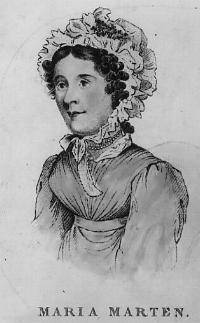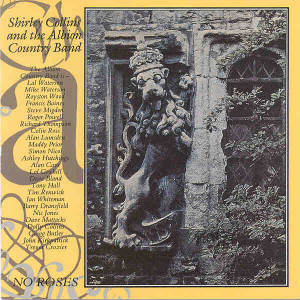|
Read All About It !!'Orrible Murder!!

In the day before there were newspapers and before there were 24-hour news channels, the general public had
to rely on what is called street literature to find out what was going on. The most popular form of this was
the 'broadside' - the tabloid newspapers, if you will, of their day. Sometimes they were pinned up on walls
in houses or ale-houses, or sold on the streets, not unlike newspapers of today, these single sheets carried public
notices, news, speeches and songs and other topics of interest, that could be read (or sung) aloud, and the Murder of
Maria Marten is a text book prefect example of this tabloid style, it fits right in, even today, there is actually an opera
as well, which we'll provide a link to......anyway to the events surrounding this dreadful and chilling crime that took place
in Polstead, Suffolk, in May 1827.
After a brief courtship, Corder told Marten that he wished to marry her, and visited her family's home to inform them
about the arrangements for the ceremony. Instead of taking her to Ipswich, however, he took her to a part of his premises
called the Red Barn and murdered her. After being found guilty by the jury, Corder then confessed to the crime. He was executed
on the 11th of August, 1828. A broadsheet, supposedly written by Corder himself, though this was highly unlikely,( it was
the fashion to say that these "confessional ballads" were written by the condemned person) was published in London
by James Catnach about this crime, and, indeed, if it had been a record album, it would have been certified as a gold record
for it sold over one million copies.
 |
 |
|
as recorded by Shirley Collins and The Albion Band
Murder of Maria Marten
“If you'll meet me at the Red Barn
As sure as I have life
I will take you to Ipswich Town
And
there make you my wife.”
He straight went home and fetched his gun,
His pickaxe and his spade.
He went unto the Red Barn
And
there he dug her grave.
Come all you thoughtless young men,
A warning take by me
To think on my unhappy fate
To be hanged
upon a tree.
My name is William Corder,
To you I do declare
I courted Maria Marten,
Most beautiful and fair.
I promised I would marry her
Upon a certain day;
Instead of that I was resolved
To take her life
away.
I went unto her father's house
The eighteenth day of May
And said, “My dear Maria,
We will
fix a wedding day.”
With her heart so light she thought no harm
To meet me she did go.
I murdered her all in the barn
And
laid her body low.
After the horrid deed was done
She laid there in her gore
Her bleeding, mangled body lay
Beneath
the Red Barn floor.
Now all things being silent
Her spirit could not rest.
She appeared unto her mother
Who'd suckled
her at her breast.
For many a long month or more
Her mind being sore oppressed,
Neither at night nor yet by day
Could
she take any rest.
Her mother's mind being so disturbed
She dreamed it three nights o'er,
Her daughter she lay murdered
Beneath
the Red Barn floor.
She sent the father to the Barn
Where he the ground did thrust
And there he found his daughter
Lay
mingling with the dust.
My trial was hard, I could not stand,
Most woeful was the sight
When her dear bones was brought to prove
Which
pierced my heart quite.
Her aged father standing by,
Likewise his loving wife,
And in her grief her hair she tore
She scarcely
could keep life.
Adieu adieu, my loving friends,
My glass is almost run.
On Monday next will be my last
When I am
to be hung.
So all young men who do pass by
With pity look on me
For murdering of that young girl
I was hung
upon a tree.
Trad. arr. Shirley Collins
|
|
 |
 |
|
 |
|
 |
 |
|

|
| Pegasus 7 (LP, UK, 1971) |
|
|
Side 1
Claudy Banks (4:37)
The Little Gypsy Girl (2:16)
Banks of the Bann (3:38)
Murder of Maria Marten (7:28)
Side 2
Van Diemen's Land (4:59)
Just as the Tide Was A-Flowin' (2:13)
The White Hare (2:43)
Hal-an-Tow (2:54)
Poor Murdered Woman (4:17)
All tracks Trad. arr. Shirley Collins,
published by Roberton Brown
except track1 Bob & Ron Copper,
published by Copper Songs
|
|
Shirley Collins said in the
No Roses sleeve notes:
This was Ashley's [Hutchings] choice. The tune is of the Dives and Lazarus family, one of the great melodies
of the British tradition (listen to Vaughan Williams's Dives and Lazarus or Star of the County Down by Van
Morrison for two examples). The Red Barn Murder has fascinated people ever since it happened last century, and Ashley's treatment
of it is equally intriguing. His device of breaking the ballad up in this rather extraordinary way, and the inspired sound
effect of the cart crunching on the gravel at the hanging give it a chilling edge.
|
|
 |
 |
|
 |
 |
 |
|
|
 |
 |
 |
|
|
|

